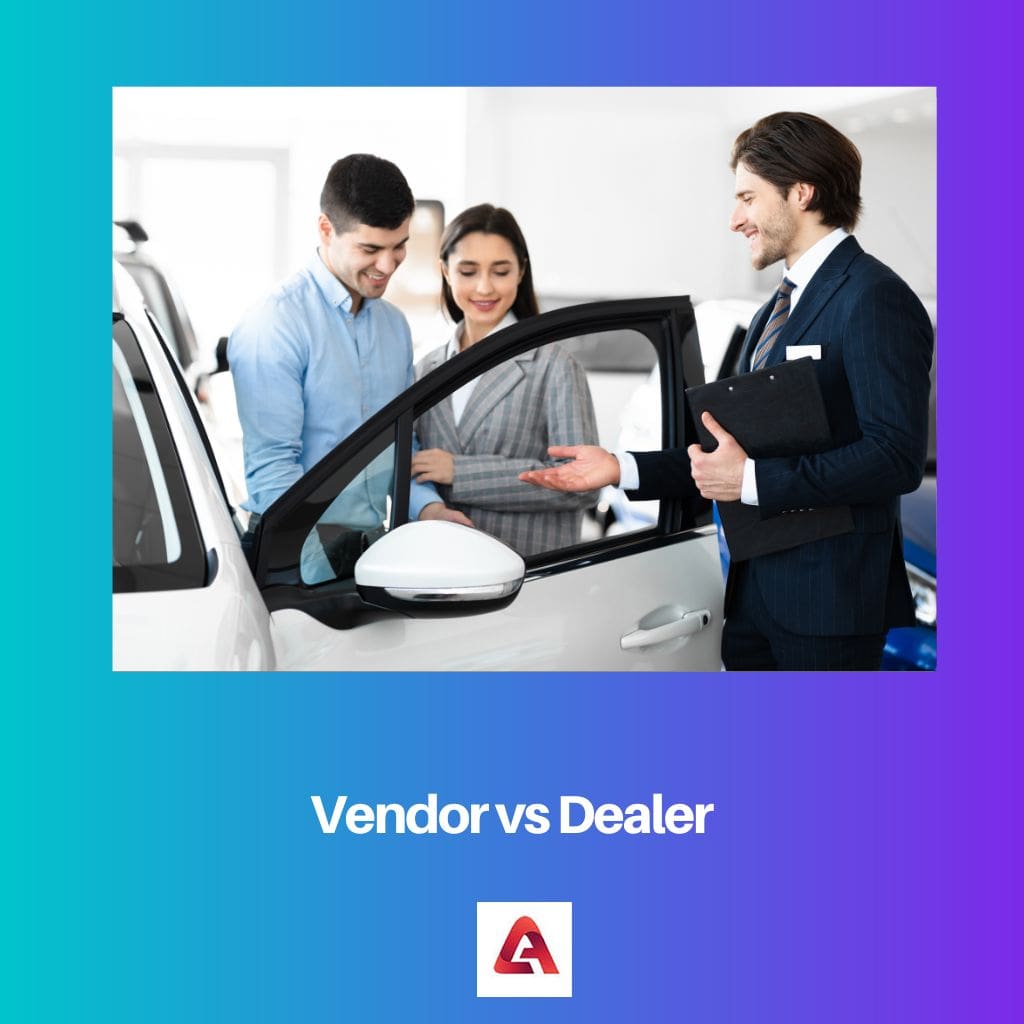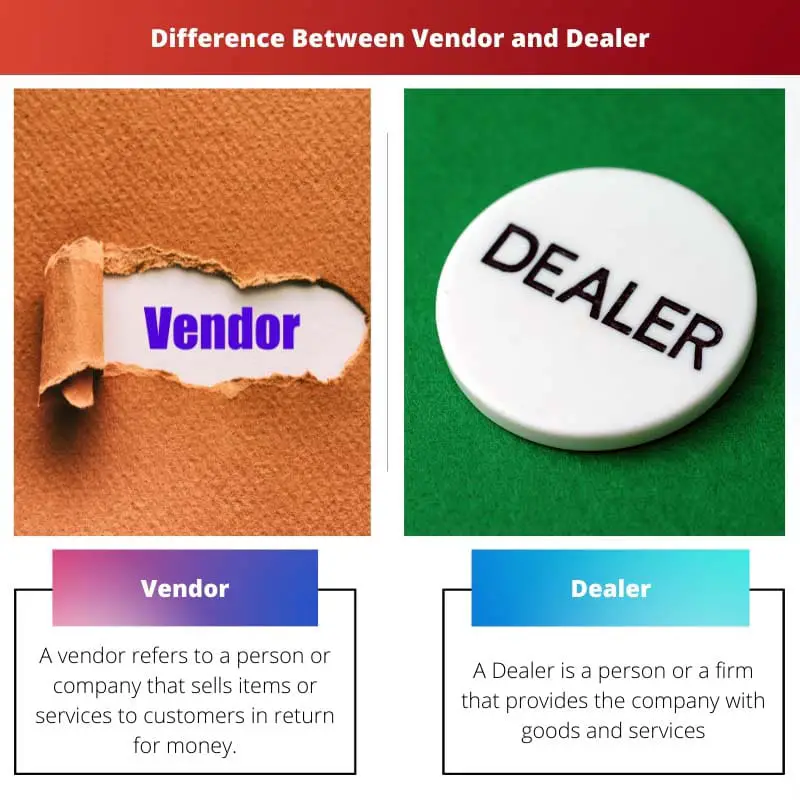Producers and consumers are the primary elements of a supply chain. However, it also involves other intermediates like vendors and dealers. These people act as middlemen.
A lot of people use these two terms interchangeably. However, they are different terms. Therefore, the difference between these two terms should be made clear so that people do not confuse them with one another.
Key Takeaways
- A vendor is a seller who supplies goods or services, while a dealer is a person or company that buys and sells goods.
- A vendor may sell products to end customers, while a dealer may sell to end customers and other businesses.
- Vendors may not have a physical storefront, while dealers have a physical location where they sell their products.
Vendor vs Dealer
The difference between a vendor and a dealer is that a vendor is a final link in the distribution network that sells items and services to clients. A vendor can be a single person or a group of individuals. A dealer is a professional who helps in the reselling sector of a commodity from the factory to the client, working as a link between the maker and the customer. A dealer works solely to market a single product or brand, whereas a vendor works with a wide range of items and commodities.

The vendor, the ultimate element in the supply chain that provides products and services to customers, can be a single individual or a business component.
A vendor buys things from manufacturers and retailers and sells them to customers. As the final person in the manufacturing and marketing cycle, they sell directly to the end buyer.
A dealer works only in the resale a certain item from the manufacturing region to the client, acting as an intermediary between the producer and the buyer.
Despite playing a little but significant role, dealers benefit from distribution network advantages such as marketing assistance and reward programs.
Comparison Table
| Parameters of Comparison | Vendor | Dealer |
|---|---|---|
| Work | A vendor refers to a person or company that sells items or services to customers in return for money. | A Dealer is a person or a firm that provides the company with goods and services. |
| Term usage | For B2C sales relationships, we use the word vendor. | When it comes to B2B sales, however, we refer to the connection as a Dealer. |
| Services obtained | Vendors give critical information based on customer feedback on products and services and ensure that items delivered to end-users are of high quality and comply with all applicable rules. | Dealers provide services and products from their stock and release the final marketing data. |
| Advantages provided | Vendors do not receive much help from suppliers. | Suppliers provide several benefits to dealers, including promotional support, incentive programmes, and product training. |
| Product promoted | The vendor deals with a wide variety of products and commodities. | A dealer works exclusively to promote a particular product or brand. |
What is Vendor?
Someone who works for a firm that sells goods and services to other businesses and clients is referred to as a vendor or provider.
Vendors are part of the supply chain, which is the network of all the people, organisations, resources, activities, and technology involved in the manufacturing and sale of a product, from the transportation of raw materials to the manufacturer to the ultimate customer.
Part manufacturers sell pieces to other manufacturers, who assemble them and sell them to wholesalers or retailers. Retailers are businesses that sell things to customers.
The word is widely given to providers of goods and services to other enterprises in information technology and other industries.
A level 1 vendor is a significant and well-known company with public recognition and acceptability domestically or worldwide. Producers and value-added resellers are both possible Tier 1 providers (VARs).
A level two vendor is a lesser-known and smaller company with restricted geographical distribution. As a result, tier 2 vendors have considered a backup instead of a primary supplier.
Vendor management organizations (VMOs) are internal entities devoted to analysing third-party suppliers of products and services, overseeing day-to-day contacts, and maintaining long-term partnerships in certain businesses.

What is Dealer?
Dealers acquire and sell accessible capital money through their accounts and may also use agents for similar objectives in trading.
Dealers frequently trade securities and provide investors with financial services. As a result, in the over-the-counter market, dealers are the market makers who provide the chance to bid and place quotations against the price of securities.
Long-term growth potential is boosted by dealers responsible for providing liquidity in the markets. Regarding his account, a dealer, rather than a broker, operates as the principal in trading.
Customers entrust their orders to dealers, who execute them on their behalf. In the securities market, dealers are common. They give many kinds of services to customers and contribute to assets.
They may also demand incentives and profits for the sales and profits they promote. They also play an important role in maintaining market liquidity.
Dealers do not conduct business on behalf of customers or assist in the completion of deals involving different parties. A dealer operates solely to promote a specific product or brand.
When it comes to B2B transactions, nevertheless, the link is referred to as a supplier or dealer.

Main Differences Between Vendor and Dealer
- A vendor is a person or organization that offers goods or services to clients in exchange for money. A dealer is a person or entity that provides goods and services to the firm.
- People use the term vendor to refer to business-to-consumer sales partnerships. However, we refer to the link as a supplier or vendor whenever it concerns business-to-business transactions.
- Dealers provide services and products from their shares and discharge the final business information. In contrast, vendors provide relevant information based on customer satisfaction surveys on options and ensure that items delivered to end-users are of excellent quality and comply with all applicable rules.
- Manufacturers give dealers extra perks, including lucrative promotional support, performance bonuses, and product training, whereas vendors get little help.
- A dealer’s only purpose is to promote a specific product or brand, while a vendor works with various things and commodities.





